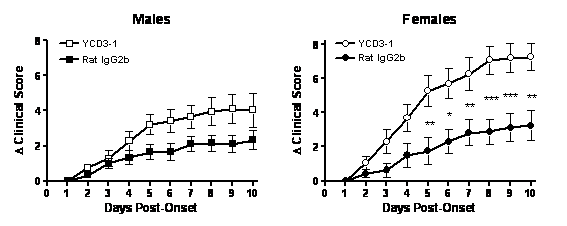Session Information
Session Type: Abstract Submissions (ACR)
Background/Purpose: We have previously characterized naturally occurring forms of CD3e that lack the aminoterminal region (DNH2-CD3e) and are bound with high avidity by the YCD3-1 antibody (Criado et al., Eur J. Immunol 30, 1469). The presence of high levels of DNH2-CD3e results in weaker TCR-CD3 interactions and increased TCR mediated signalling and functional responses. To understand the potential contribution of DNH2-CD3e to arthritis development, we have evaluated disease progression and functional responses in collagen-induced arthritis after treatment with YCD3-1 antibody.
Methods: Arthritis was induced in 8-10 weeks old male and female DBA/1 mice by intradermal immunization with 200 mcg of chicken type II collagen (CII) in Complete Freund Adjuvant (CFA). Mice were treated on the day of arthritis onset with YCD3-1 or control rat IgG2b (50 mcg/mouse) and arthritis severity was evaluated daily during ten days. Effect of anti-CD3 treatment in vivo was assessed by flow cytometry to detect Treg (FoxP3+), Th1 (IFNg+) and Th17 (IL17+) CD4 T cells in lymph nodes. To analyze T cell responses in vitro, lymph node cells were stimulated with CII, proliferation was measured by incorporation of the colorimetric reagent WST-1 and IFNg and IL17 levels were quantified by ELISA. Serum levels of anti-CII antibodies were determined by ELISA. Statistical differences were analyzed by ANOVA and Mann-Whitney U-test using GraphPad Prism software. P values < 0.05 were considered significant.
Results: Treatment of CIA mice with YCD3-1 increased disease severity in female DBA/1 mice compared to control-treated mice. Differences appeared the first day after treatment and reached statistical significance on day five and later (Figure 1). A similar trend was observed in arthritic males, although differences did not reach statistical significance. Levels of anti-CII antibodies were not affected by YCD3-1 treatment.
Analysis of CD4 T cell populations in YCD3-1 treated mice showed an enrichment in FoxP3+ Treg cells (16.85 ± 4.7 % vs 10.25 ± 2.57% in control mice, **P= 0.003). IFNg and IL17 producing cells were also increased (IFNg: 2.77 ± 2.07 % vs 0.79 ± 0.25 %, **P= 0.003; IL17: 1.74 ± 1.01 % vs 0.64 ± 0.23 %, ***P= 0.0003). Ratio of Treg to Th17 cells was reduced (10.91 ± 3.18 % vs 17.95 ± 7.21 %, P= 0.04). No significant differences were observed in Treg/ Th1 ratio. In vitro stimulation with CII caused higher proliferation and production of IFNg and IL17 in lymph node cells from anti-CD3 treated mice.
Figure 1. Severity of CIA in male and female DBA/1 mice treated with YCD3-1 anti-CD3 antibody.
Conclusion: Targeting DNH2-CD3e in vivo reduces Treg/Th17 ratio and exacerbates collagen induced arthritis. Our results suggest that DNH2-CD3e can contribute to arthritis progression.
Disclosure:
M. J. Pérez-Lorenzo,
None;
E. Gonzalo,
None;
J. M. Rojo,
None;
M. Galindo,
None;
J. L. Pablos,
None;
G. Criado,
None.
« Back to 2012 ACR/ARHP Annual Meeting
ACR Meeting Abstracts - https://acrabstracts.org/abstract/exacerbation-of-collagen-induced-arthritis-by-an-anti-cd3-antibody-targeting-aminoterminal-deficient-cd3%ce%b5/

